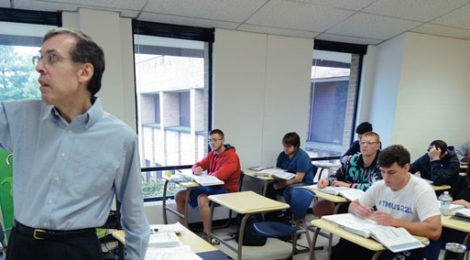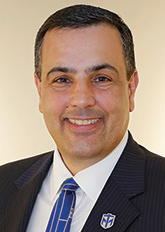
Liberal Arts is the Game Changer in the Job Market
The Changing Landscape of Higher Education

Across the country, higher education is facing serious disruption to its business model. As demographics shift, costs escalate, and students and their families question the value of a college education, we are experiencing rapid change and the need for greater innovation. Over the past several months, the University has taken great care in planning for its future. Rather than reacting to external challenges, we are defining the type of university that Thomas More will be for its faculty, staff, students, and alumni.
As I often say, education is a transformative endeavor, not a transactional exchange. It is a community, not a commodity. Because of this, we’re taking the necessary steps to do more than prepare students for the career field. Taking a holistic – mind, body, spirit – approach, we are preparing our students not only for their first job, but for their next five jobs.
Recent evidence of Thomas More’s success in preparing students was highlighted by a report released from Georgetown University. In this report, research proved that Thomas More has the best return on investment among other higher education institutions in Kentucky. This means that among the other 28 private and public universities and colleges in four benchmarks – at 15, 20, 30, and 40 years after enrollment – the University ranked highest. I’m proud of the work we do here, and I believe that this speaks volumes to the investment we are making in our students. We demonstrate incredible dedication to quality, personalized, intentional education practices that are grounded in the liberal arts, and reports such as these further prove that the holistic, liberal arts education and experience we provide is worthy of investment because of the impressive return that it provides to our students and our alumni. The liberal arts are alive and well.
Though our students and alumni know the return on investment we have to offer at Thomas More, we still face adverse judgment as a private university residing within the liberal arts realm. To combat this, it’s important, now more than ever, that we’re instilling in our students the essential skills they’ll need to be successful in their future endeavors – no matter what those endeavors may look like. By exemplifying and putting emphasis on teamwork, written and oral communication, critical thinking, numeracy, creativity, humility, and cross-cultural knowledge, our faculty are making sure our students are established so they stand out and succeed. As a product of a liberal arts education myself, I am grateful for the appreciation for civil discourse, the culture of collaboration, and the spirit of innovation that was fostered in me, all of which have served me well and prepared me for a dynamic workforce. I believe so much in this holistic education that I often tell my children that when it comes time for them to go to college, my hope is that they will choose a major in which they have a passion, but I also encourage them to receive a liberal arts education, as it will serve them well in life and in their future careers.
As president of Thomas More, I commit to stand firm against an eroding public opinion about the liberal arts that is being facilitated by some of our social and political leaders. While many politicians are narrowly focused on the importance of workforce development jobs, Thomas More will continue to provide our students with a quality, values-based education that will prepare them for meaningful lives and brilliant careers. Only focusing on workforce development, as many higher education institutions are being pushed to do so today, is short sighted and will only serve some for a short period of time. If technology has shown us anything, it is what happens when disruption hits the marketplace. The pace of innovation is so fast that institutions and people are often unable to adapt to the demand. Liberal arts universities and colleges must be more nimble and more innovative in their approach. We must continue to teach and inspire our students to be the ethical leaders of tomorrow. We must realize that the world that we educate our students to live and to work in will be dramatically different than the one that we live in today.
As we look to the future, we must not forget that the strength of our Thomas More education is its strong liberal arts foundation in the Catholic Intellectual Tradition. Since this institution’s founding, we have, and continue to, position ourselves as a regional leader in liberal arts education as we remain agile to meet the needs of our students. We understand the needs of the marketplace to ensure that our academic programs are relevant and that our students are prepared to be ethical leaders and engaged citizens. The foundational principles set forth in our Catholic identity alongside our liberal arts values will continue to inform our educational practices and prevent our University from straying from our mission during this important time in history.

Comments are closed, but trackbacks and pingbacks are open.